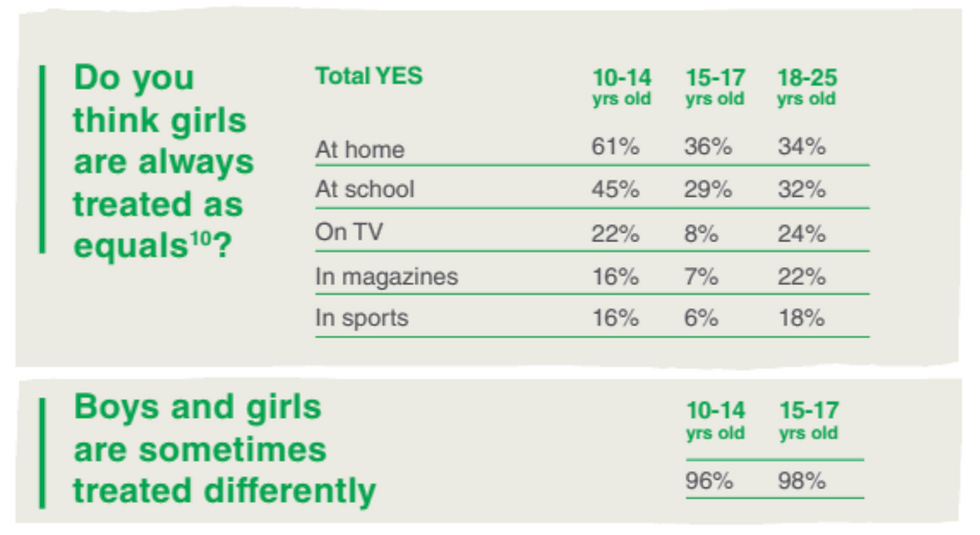By Luiza Knijnik

I was only nine years old when I was introduced to the idea of gender stereotypes. All the boys in my grade had been sent to go fishing, while the girls were forced to stay behind at school learning to sew. I asked my teacher why we didn’t get to go, and she replied that fishing was for boys and we had to stay at school doing girl things.
I think that was the first time in my life I wished I was a boy. It was the first time I understood that in this society being a boy was better than being a girl. I started getting really into sports and becoming a ‘tomboy’ was my goal.
I scorned the girls that liked pink and hated anything that was too girly.
I don’t know what would have happened if I didn’t have parents who explained to me that being a girl wasn’t a bad thing, actually being a girl makes you powerful.
Being feminine doesn’t make you weak.
But I wonder what would have happened if these stereotypes hadn’t been reinforced to me at such a young age. What would happen to the future of Australia, if we combatted these stereotypes actively? What would happen if we trained teachers to dispel these stereotypes and not pass their preconceived notions to their students?
What happened at my primary school was so ridiculous, that it doesn’t seem true. But unfortunately, it is true.

Most cases aren’t as evident as this one, but the subtle comments such as ‘boys will be boys’, excusing a bad behaviour, or telling boys to ‘be a man’ are shaping the views of kids for their whole lives.The little incidents that occur so often when we’re little, reinforce the differences between being a girl or a boy and they have lasting consequences on today’s youth.
These stereotypes perpetuated and fostered in primary schools, can have devastating consequences as kids move to high school and beyond.

For a country that claims to be gender equal, what is happening in our education system is failing us every day. A survey in 2017 conducted by Plan International Australia, found that 98% of the girls who participated felt some sort of gender inequality in aspects of their lives.
This included how they are treated at school, with only 45% of younger girls feeling as if they are treated equally. Right now, we are building a path to maintain gender inequality.
We all see the stories on the news of high schools in Australia demonstrating blatant sexism and reinforcing stereotypes: A High School in the Sutherland Shire area had an all-girls assembly where their principal told them the length of their skirts was distracting the male teachers and the boys at their school.
Only a few days ago students from an elite private school in Victoria, on a crowded train with children and women present, were filmed chanting “I wish that all the ladies; Were holes in the road; And if I was a dump truck; I’d fill them with my load.”
These disgusting displays of misogyny and disrespect for women perpetrate the message Australian kids are taught from a young age: Men are superior.
For all the talk of gender equality and the progress Australian women have made, more needs to be done in our schools. Having several lessons that briefly cover gender equality and domestic violence isn’t enough anymore. It was never enough.
We need a nationwide education program specifically aimed at combating these stereotypes from a very young age. Girls need to be involved in the making of this program. Because this time around it isn’t just the kids that need to change. It is the teachers and the parents that need to change. More than anything this program needs to target adults as well.
In international women’s day our prime minister Scott Morrison made a speech where he stated that “We want to see women rise. But we don’t want to see women rise only on the basis of others doing worse.”
This is exactly the attitude that needs to change. Too many Australian kids view gender equality as the tearing down of boys. When the country’s leader says it, why should we question it?
But we need to question it for the sake of all the kids in Australia.
I never want a little boy to be bullied for liking “girly stuff,” or a little girl to feel as if she is inferior simply due to what a girl is seen as.
I never want future generations to live with the stereotypes my generation has had to face.
Times are changing. The old boys club attitude that is present in every level of Australian society has to change.
Education is the key to the future and our educators must deliver on their promise to shape our future. It is cheaper to invest in our education than try and remedy the violence and sexism against women in the future.
* The views and opinions expressed in this article are those of the author(s) and do not necessarily reflect the official position of the Woke magazine.

Comments